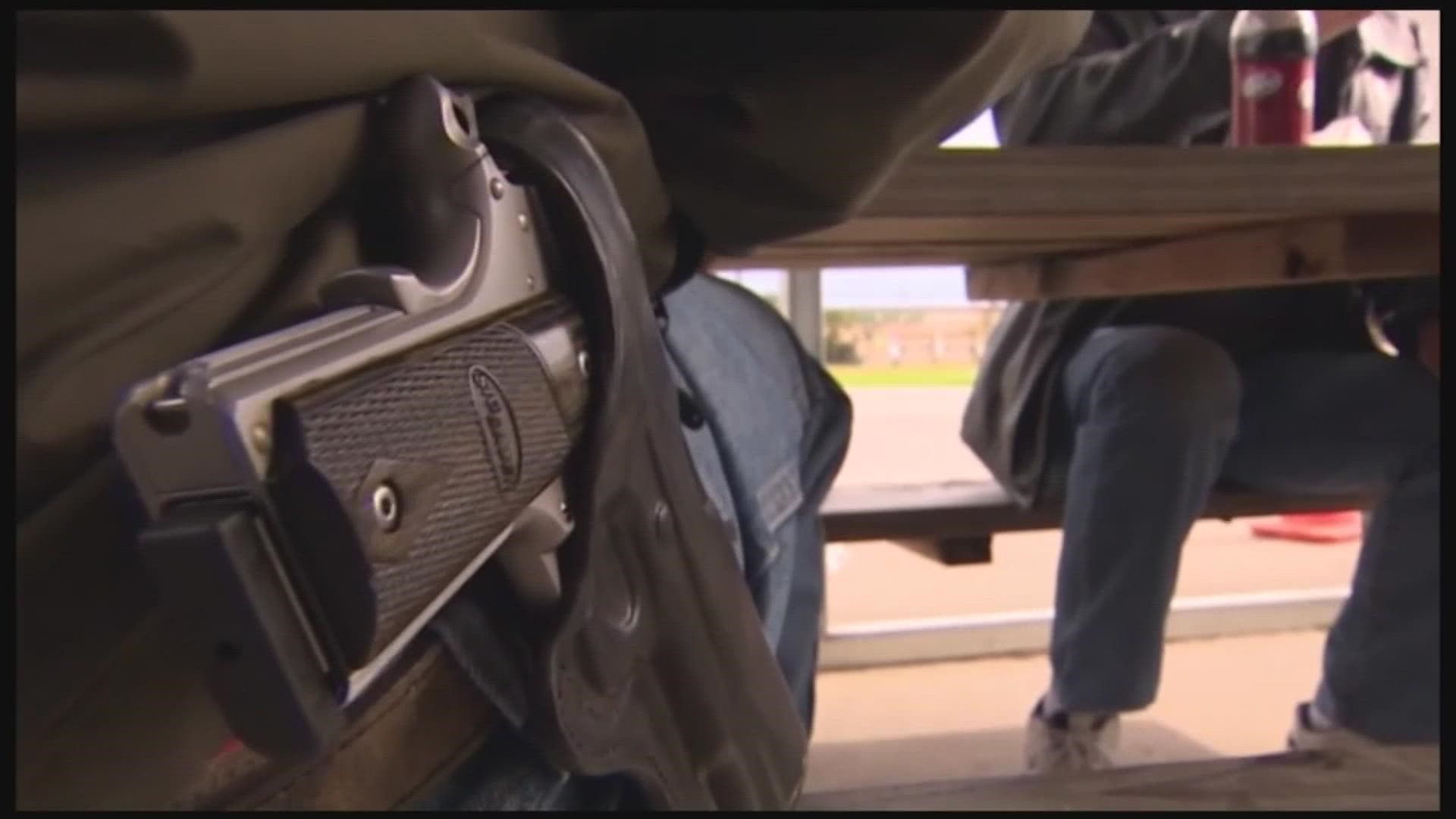COLUMBUS, Ohio — The hearing began with a moment of silence to commemorate the ninth anniversary of the Sandy Hook Elementary School Shooting, in which a young man shot and killed 20 children and six adults.
It ended with Republicans on the Veterans and Public Safety Committee voting to send to the Senate floor legislation to remove training and background check requirements for Ohio residents to carry a concealed weapon.
Tuesday’s hearing marked some of the final legislative work of 2021. The full Senate could vote on the matter at its final legislative session for the year Wednesday.
Current law requires Ohioans to pass a background check and demonstrate proof of completion of eight hours of training to obtain a license to carry a concealed weapon. Senate Bill 215 would nix the requirement to get a concealed carry license for anyone 21 and up who’s allowed to possess a gun under state and federal laws.
The legislation also relieves people carrying weapons of their current legal duty to “promptly” notify police officers during a stop that they’re carrying a firearm. The legislation only requires them to notify the officers if they ask.
The Ohio House passed near-identical legislation last month. Should the Senate pass its version Wednesday, both chambers will still need to agree on a final piece of legislation to send to Gov. Mike DeWine for veto or approval.
Passage of the legislation — “constitutional carry” or “permitless carry,” as its commonly labeled — would constitute a win for gun lobbyists and gun rights advocates who have pushed the idea for years.
The Statehouse action caps a violent year, nationally and locally. Data from the state Department of Health shows 1,755 Ohioans died from four different types of gun violence in 2020: accidental discharges, suicide, homicide, and discharges with unknown intent. This marks a record high for any full year of data, which goes back as far as 2007. Ohio and the rest of the country are experiencing a homicide spike in 2021, Axios reports, with Ohio likely to break the record for gun violence it set last year.
More than 780 expanded homicide offenses (homicide, rape, robbery or aggravated assault) occurred in Ohio in 2020, according to data from the FBI. Over the previous 10 years, about 535 such offenses on average were recorded.
Republicans and gun advocates have downplayed any link between gun violence and loosened gun laws. They frame the debate around constitutional rights. Republicans also emphasize the legislation doesn’t allow people currently prohibited from carrying a concealed weapon to do so — it merely removes a permitting process.
Sen. Terry Johnson, R-McDermott, a physician who sponsored the legislation, said in an interview Tuesday the U.S. Constitution says nothing about permitting or training to carry guns. The legislation, he said, puts citizens in control of their own safety. He said recent spikes in gun violence and crime rates suggest this is the right time to pass legislation expanding people’s rights to defend themselves.
“People don’t want the government to tell them whether or not they can bear arms,” he said.
Every year, somewhere between 3,000 and 5,000 Ohioans’ concealed carry licenses are suspended, revoked or denied, according to data from the Ohio Attorney General. Certain criminal charges, convictions, mental illnesses or protective orders prohibit people from receiving a concealed carry license under current law.
Ohio created its concealed program in 2004 with a 12-hour training requirement at the time. Lawmakers passed a “stand your ground” law last year, removing the legal duty that a person try to retreat before responding to a perceived attack with lethal force. In that time, there hasn’t been “blood in the streets” or a “wild west” mentality, according to Buckeye Firearms Association’s top lobbyist Rob Sexton in previous interviews.
Democrats and anti-gun violence advocates have criticized permitless carry proposals, citing public health data from the National Bureau of Economic Research or the American Journal for Public Health showing links between permitless carry laws and violent crime.
Law enforcement officials have aligned with Democrats on the issue. At the hearing Tuesday, Fraternal Order of Police lobbyist Michael Weinman said removing the duty to notify officers about a weapon in a vehicle poses a clear risk to officer safety.
Hamilton County Sheriff Charmaine McGuffey made broader criticisms, warning lawmakers that people will be killed as a result of more, untrained people with access to guns.
“Training creates an awareness of the immense amount of responsibility in carrying that firearm,” she said.
Twenty-one states allow inhabitants (residents only in North Dakota) to carry a concealed weapon without a permit, according to a count from the U.S Concealed Carry Association. This includes neighboring states of West Virginia and Kentucky.
In Ohio, the state supreme court holds that the constitutional right to bear arms does not guarantee the right to carry a concealed weapon.
“There is no constitutional right to bear concealed weapons,” wrote Justice Paul Pfeifer in a 2003 majority opinion.
The timing on a vote is hazy. Both the committee chairman and Johnson said they didn’t know for sure whether the bill will go up for a floor vote at Wednesday’s session.

